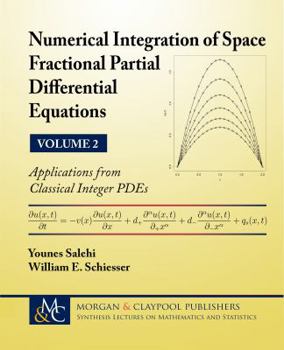Numerical Integration of Space Fractional Partial Differential Equations: Vol 2 - Applications from Classical Integer Pdes
Select Format
Select Condition 
Book Overview
Partial differential equations (PDEs) are one of the most used widely forms of mathematics in science and engineering. PDEs can have partial derivatives with respect to (1) an initial value variable, typically time, and (2) boundary value variables, typically spatial variables. Therefore, two fractional PDEs can be considered, (1) fractional in time (TFPDEs), and (2) fractional in space (SFPDEs). The two volumes are directed to the development and use of SFPDEs, with the discussion divided as: -Vol 1: Introduction to Algorithms and Computer Coding in R -Vol 2: Applications from Classical Integer PDEs. Various definitions of space fractional derivatives have been proposed. We focus on the Caputo derivative, with occasional reference to the Riemann-Liouville derivative. In the second volume, the emphasis is on applications of SFPDEs developed mainly through the extension of classical integer PDEs to SFPDEs. The example applications are: -Fractional diffusion equation with Dirichlet, Neumann and Robin boundary conditions -Fisher-Kolmogorov SFPDE -Burgers SFPDE -Fokker-Planck SFPDE -Burgers-Huxley SFPDE -Fitzhugh-Nagumo SFPDE. These SFPDEs were selected because they are integer first order in time and integer second order in space. The variation in the spatial derivative from order two (parabolic) to order one (first order hyperbolic) demonstrates the effect of the spatial fractional order with 1
Format:Paperback
Language:English
ISBN:1681732092
ISBN13:9781681732091
Release Date:December 2017
Publisher:Morgan & Claypool
Length:205 Pages
Weight:0.80 lbs.
Dimensions:0.4" x 7.5" x 9.3"
Customer Reviews
0 rating





